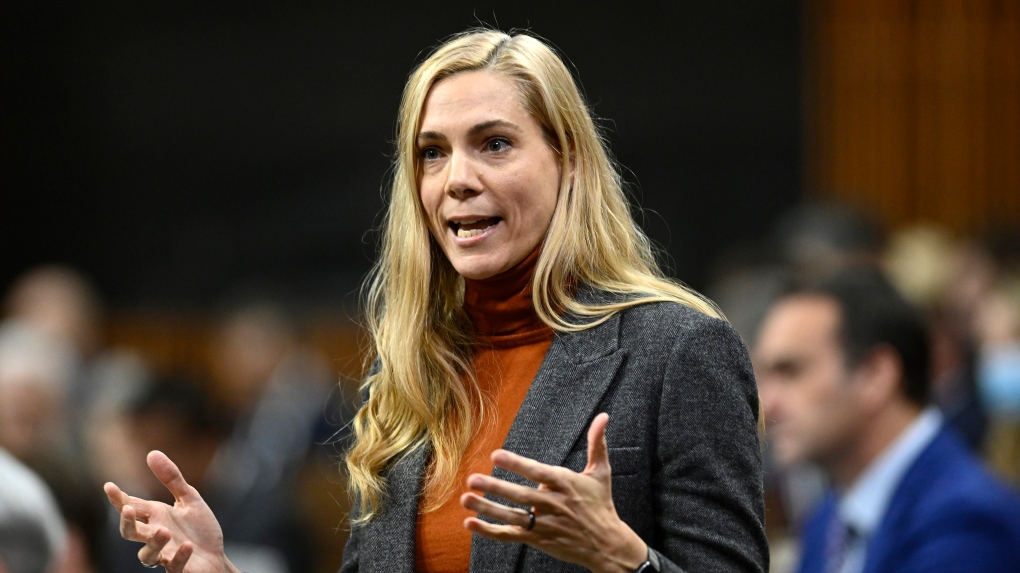Canada’s Minister of Sport has committed $2.4 million in crisis funding for athlete mental health.
Pascale St-Onge announced Monday in Montreal that the money will support crisis care, education and training for Olympic and Paralympic athletes and coaches.
A wave of active and retired athletes have reported abusive and toxic environments in high performance sport in Canada. They demanded a culture change in the system and their federations, and there were also calls for a national inquiry into the sport.
St-Onge told The Canadian Press his conversations with the athletes revolved around two themes: the stress and isolation of training and competing for two Olympics due to COVID-19 restrictions, as well than the anxiety and strain of relationships with those who oversee and manage them. .
“One thing that has become very clear to me is that athletes are going through a tough time right now,” St-Onge said in a phone interview. “There is a lot of anxiety.
“The last few months have been pretty tough for athletes in the conversation about safe sport, about all the abuse, harassment and sometimes sexual abuse that we hear about in many different sports.”
The extra money is intended to give athletes access to mental health professionals where they train and compete.
“They have access to psychological support, but it is very focused on sports performance and helps them achieve their goals,” explained St-Onge.
“It’s a new element. The goal is to have people on site directly where the athletes train and compete, so when there is a situation they have support on site to deal with those issues. .”
St-Onge spoke about bobsleigh and skeleton athletes and their conflicted relationship with their leadership. More than 70 athletes called for the resignation of the federation’s president and high performance director throughout the summer.
A new president was elected in November.
“I was extremely worried about the impact it had on them because when they perform, it’s a high-speed sport, they put themselves in danger,” St-Onge said.
“If they’re not completely focused on what they’re doing and their technique, if they’re worried about things going on outside, it can be really dangerous for them. I felt it was necessary to provide direct support in these kinds of situations.”
Three-time Olympic bobsledder Neville Wright, who represents his sport and athletics on the AthletesCan board, says funding for mental health is a start.
“There is an immediate need for mental health resources,” he said. “With everything going on in the sport right now, there’s definitely a need right now.
“But I think if somehow we can change the culture, change the culture and improve the culture as a whole, maybe the need for mental health resources could potentially decrease.”
The money will be administered through the network of sports institutes across the country and the Canadian Olympic Committee’s wellness program, Game Plan.
“The COC congratulates Minister St-Onge and the Government of Canada on this important investment in Canadian sport,” COC CEO David Shoemaker said in a statement.
“Investments like this, which will address the urgent mental health needs of Canadian athletes, are a critical step in making sport as safe and inclusive as possible.”
St-Onge launched the Office of the Sports Integrity Commissioner in June to deal with complaints. The office received 24 complaints between June and September.
Sports organizations must become signatories to the office in order to receive federal funding.
“I’m working on a lot of things to change the sport system to make the environment safer for athletes,” St-Onge said. “It was something I felt was needed at the moment.”
Two parliamentary committees have held hearings on Canadian sport in recent months. A heritage committee has stood up to Hockey Canada over its handling of sexual assault allegations.
Female athletes testified before a women’s committee on sports safety for women and girls earlier this month.
“The two committees currently studying the sport system are doing a great job and asking the right questions,” St-Onge said.
“The heritage committee looks more at the governance of sports federations and the women’s committee talks to victims, listens to their stories, as well as experts who have worked their whole lives in the research and environment of safe sport .
“We are still waiting for their recommendations. They are going to be extremely important. There are so many things we need to work on.”

“Gamer. Introvert. Problem solver. Creator. Thinker. Lifelong food evangelist. Alcohol advocate.”
